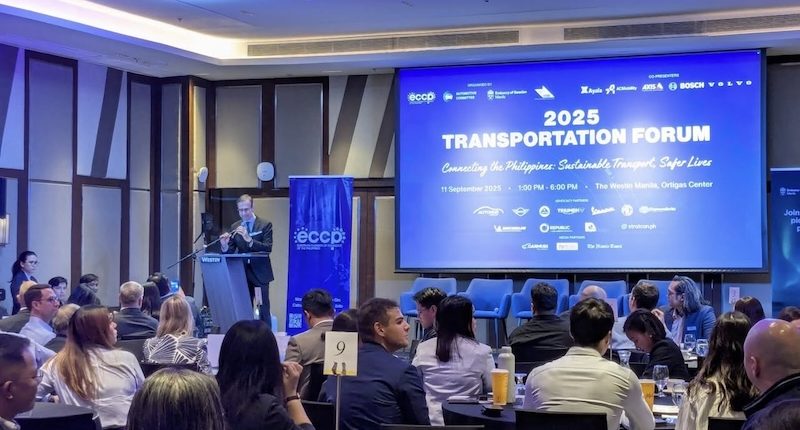-
The European Chamber of Commerce of the Philippines, in partnership with Team Sweden, successfully concluded its 2025 Transportation Forum, with calls for deeper government and private sector collaboration to advance sustainable transportation in the country
-
The event featured high-level dialogues, panel discussions, and breakout sessions that explored innovative approaches to creating a more efficient, safe, and sustainable land transport ecosystem
The European Chamber of Commerce of the Philippines (ECCP), in partnership with Team Sweden, has successfully concluded its 2025 Transportation Forum, with calls for deeper government and private sector collaboration to advance sustainable land transportation in the country.
Under the theme “Connecting the Philippines: Sustainable Transport, Safer Lives,” the forum on September 11 discussed pressing challenges and opportunities facing the country’s transportation system amid rapid urbanization, increasing demand for mobility, and the global push for decarbonization.
The event featured high-level dialogues, panel discussions, and breakout sessions that explored innovative approaches to creating a more efficient, safe, and sustainable transport ecosystem.
Throughout the day, speakers called for deeper collaboration between the government and private sector on areas such as: education of drivers, advancement of vehicle safety technologies, integration of smart transport infrastructure, and implementation of sustainable transport policies.
ECCP president Paulo Duarte underscored the vital role of the transportation sector in the Philippine economy.
He shared, “The transportation sector is the backbone of the Philippine economy. It connects our islands, links businesses to markets, and provides millions of Filipinos with access to jobs, education, and essential services. Yet challenges remain. Every year, more than 12,000 lives are lost in road crashes — with motorcyclists and young Filipinos most at risk.”
Duarte noted that the economic toll is also heavy, amounting to around P105 billion annually in medical costs, lost productivity, and property damage. At the same time, the country’s road and rail infrastructure continues to struggle to keep pace with growing demand, while limited public transport options restrict mobility and hinder economic growth.
Duarte highlighted ECCP’s recommendations to expand the number of Motor Vehicle Inspection Centers, broaden the implementation of the Child Car Seat Law, require Electronic Stability Control for passenger cars, and Anti-Lock Braking Systems for motorcycles; and to promote dashboard camera installation and review car tint restrictions for both public and private vehicles to improve visibility and safety.
From Team Sweden’s end, Anna Ferry, Ambassador at the Embassy of the Kingdom of Sweden in Manila, highlighted her country’s pioneering road safety initiative, Vision Zero – a policy framework that has halved road fatalities in Sweden since its adoption in 1997.
Furthermore, she cited Sweden’s support for the EDSA Busway Project and ongoing collaboration with the Philippine government through Swedfund, including studies to improve bus standards and reduce CO₂-emissions.
The EDSA Busway is one of several key initiatives of the Department of Transportation (DOTr) aimed at modernizing and improving the country’s transport systems.
Other projects, according to DOTr undersecretary for road transport and infrastructure Mark Steven Pastor, include the Active Transportation Program, the Taguig City Integrated Terminal Exchange, Cebu Bus Rapid Transit (CBRT), Davao Public Transport Modernization Program, and the Love Bus Service Contracting Program.
“All of these projects of the DOTr Road Transport and Infrastructure (is) part of our commitment to the public building of infrastructure developments that are not only physical, but also transformative, from a car-centric approach, we aim to see a reformed public transport system that is inclusive, efficient, and responsive to the needs of every Filipino commuter,” Pastor said.
READ: DOTr’s road, rail officials ordered to take public transport weekly
DOTr assistant secretary for railways Eduardo Danilo Macabulos, for his part, highlighted the critical role of railways in addressing the country’s mass transport needs. He emphasized that when it comes to high-capacity mass transport solutions, “there is simply nothing more efficient than railways.”
Beyond efficiency, he pointed out the environmental advantages of railways, noting that they produce five times less carbon emissions per passenger compared to diesel and petrol-powered vehicles.
READ: SCMB railway now under project development, feasibility study to start within the year
Patrick Aquino, director IV of the Energy Utilization Management Bureau of the Department of Energy, meanwhile, shared encouraging developments in the country’s EV sector.
He noted a significant rise in the number of electric vehicles, highlighting recent data from the Land Transportation Office. “The good news is, through the first seven months of the year, this has already increased, again, based on working numbers coming from the LTO, it’s now up to 29,715… We just wanted to show you likewise, that the sales are also picking up, at least for the last two years.”
He also clarified the Department’s regulatory approach moving forward, emphasizing collaboration and flexibility. “Again, this would be subject to public consultation, and we will be opening it up, of course, to alternative compliance mechanisms. After all, the direction on the part of the Department of Energy is for compliance to the issuance, not the imposition of fines.”
DOTr undersecretary for road transport and non-infrastructure Ramon Reyes highlighted the importance of digital transformation in making transport systems more efficient, safe, and commuter-friendly.
Jean Henri Todt, special envoy for road safety at the United Nations, in his keynote speech, emphasized the urgent and often overlooked crisis of road fatalities.
“Globally, road deaths are nearly 10 times higher than war deaths — two deaths per minute, 1.2 million deaths per year. It is the world’s leading killer of children and youth from 5 to 29 years old,” Todt said.
He stressed that governments must take the lead with comprehensive strategies, strong policies, enforceable laws, and coordinated action.
The event reaffirmed ECCP’s commitment to advocate for a safer, more inclusive, and more sustainable transport future for the Philippines.
Bosch, Volvo, Axis Communications, Ayala Corporation, and ACMobility, who are co-presenters of the event, affirmed their shared commitment to advancing sustainable, safe, and innovative transport solutions in the Philippines. Through their active participation, ECCP said these industry leaders underscore the vital role of private sector collaboration in driving the modernization of the country’s mobility landscape.
The forum is also supported by advocacy partners, including AutoHub Group, Royal Cargo, Republic Cement, Michelin, and Stratcon Philippines, and media partners, including PortCalls, Carmudi Philippines, and The Manila Times. – Roumina Pablo









